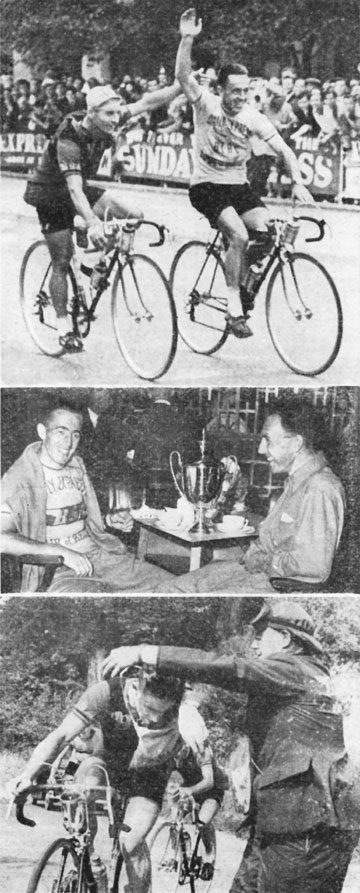|
VILLAGE and town life stopped for the Tour of Britain on Sunday's first stage from London to Great Yarmouth. Cars and other traffic drew to the roadside, even on to the grass verge! The sun shone gloriously and the glinting, colourful cavalcade was a show in itself. Cars and vans, "Service” labelled, with orderly rows of spare machines atop; motorcyclists that whooshed by, "Marshals" in yellow, "Service" in red. Feeding vans from which the motorcyclists picked up the bright musettes and sped to beyond Thetford (74 miles) for the hand-up.
In those first 70 miles I overtook the long, romping procession of riders and vehicles-30 numbered cars and vans in allotted order - and many "free-lances" like myself, labelled “Press," and the manoeuvre presented no difficulties whatever. Even though it was Sunday afternoon and the road was A11, it was possible to take to the wrong side of the road for half the overtaking run anyway and there was always a gap to drop into when a car appeared head-on.
I had one more car to pass, and the field of riders; a hump-back was ahead, so it was wise to drop into one's proper- side. When the road was clearly visible a polite voice front a. speaker on the car roof ahead said: "You could pass now; give a toot to the riders as you go by, please." I tooted and went.
Both the Daily Express and the B.L.R.C. have learned much from the past two years. The first day's organization was excellent. Only the looking-on cyclists were a danger and a difficulty during the non-racing procession - from Hyde Park to Chingford. They streamed over red-lighted crossroads. Presumably they want this new racing to develop; good behaviour on their part would help.
Overhead buzzed a photographing helicopter. On the open heaths near Newmarket it came down to side-view height and made fun for the spectators by hopping over tree clumps and then down to intimacy with the race again.
At one place I by-passed All and, taking too long, knew that I was still behind. But wait a minute: what are these knots of club-folk looking down the road, some with cameras cocked? Surely . . . I looked at my watch again . . . and then at the road. Of course, these chaps were out on another sort of cycling sport. I'd almost forgotten; the Roslyn Ladies' "12 " was the longer day's attraction up this famous racing road.
It was colour, and the loud speakers and the helicopter, that set the local populace and passing traveller agaping at the Tour of Britain. When Britain stops to watch for 1952 world's champion Luciano Ciancola; and Bob Maitland, who distinguished himself in the Belgian independent stage race; and Jean Wisinski, Ile de France Champion; and Dave Bedwell, game finisher in the recent world's professional road race; and Robert Grondelaers second in last year's Olympic road race . . . when, it's the men, the marathoners, the fellows who ride heroically and come up neat and tidy and smiling for the bouquets at the end, who capture the public imagination, then indeed will this Tour of Britain become "The Tour."
H.H.E. [Editor of Cycling]
|
“TINY” THOMAS WINS HIS LAST RACE
Dramatic 11th stage breakaway settles Tour of Britain result [The Bicycle 23-Sep-1953]
THE " Daily Express " Tour of Britain has, in three years, built up its own traditions. One of those traditions is that there shall be a surprise winner. Remember 1951 ? The comparatively unknown Ian Steel pulled it off. If there were bookies in the bike game, Steel would have been with the 66 to 1s at the beginning. Remember last year? Who imagined at the start that young Ken Russell would win on his own? A good rider, no doubt. But a Tour winner? Not on your life. But he did win it, and in brilliant fashion.
Now we come to 1953. And we have Gordon Thomas. That Thomas is a great rider in his own light there can be no doubting. That his team manager, Sid Cozens, should have made him "leader-elect" when it was plain that captain Maitland was being marked (as Steel was last year) was an obvious course - once the feat had been accomplished. Were there any who saw it coming? It is very, very doubtful. There were plenty about afterwards who said that anybody could have seen what was about to happen. But if that was the case, why did no one prevent it happening?
Gordon Thomas takes his place as winner of the 1953 Tour of Britain. With him will stand his team-mates Maitland, Newman. Jones and Ilsley. They had everything to do with that victory, and Thomas is the first to admit it. Behind them stands that enigmatic figure, Sid Cozens. They set out to put a B.S.A. man in first place, and they succeeded beyond even their own expectations.
 For Thomas, it was a magnificent swan song. "I shall retire from racing now," he said. For Thomas, it was a magnificent swan song. "I shall retire from racing now," he said.
But the B.S.A. team was not the only one in the race. In fact, team racing through the whole race was the most prominent factor.
The Wearwell riders took. team honours. Theirs was no fluke victory. Study the result lists all through. You will find no team more consistent in its placings, each man playing his part at the right time. They deserved every minute of their win. And there are quite a lot A minutes in 210 hours 28 minutes 2 seconds.
On the face of it. Bedwell's failure was due to just that lack of teamwork which other teams possessed. In the fatal-to-him Morecambe-Llandudno stage his Hercules team-mates Parker and Talbot were clear in front, leaving him with only an injured Derek Buttle as company at the back. At one point there was a gap of only 15 seconds between Parker-Talbot and Bedwell. It seems reasonable to suppose that had they dropped back and waited for their number one, then Bedwell would have been up with the leaders at the finish. As it was, the pair went with the breakaway, tried to slow it, and failed. Bedwell ended the day 22 minutes behind.
That Bedwell is himself a better rider than this particular stage might indicate is proved by the King of the Mountains table. When it came to a sprint, up hill or on the flat, Bedwell was almost unbeatable On the hills none could touch him. He took 24 points, to the next best rider's 14.
The race was won on the penultimate stage from Torquay .to Bournemouth. On that stage, Thomas and llsley with Scales and Pottier built up a lead of nearly 15 minutes on the field. The result was that Thomas jumped from seventh to first place, Scales from tenth to second, and Pottier from eleventh to third. Thomas's lead was nearly five minutes over Scales. Pottier was a minute and a half behind Scales.
Brian Robinson, who had ridden the stage wearing the Yellow Jersey, was seven minutes behind Thomas at the finish.
That must have been a bitter pill for Robinson. Until that day his racing had been clever and careful. With only Russell to help him, it was not at all surprising that he could not himself break clear of the bunch on this stage. There were too many against him. But perhaps even more disappointed than Brian, was Russell, last year's winner. That great hearted lad had cheerfully accepted the role of "domestic" to Brian - a great sporting gesture.
Brian himself made terrific attempts on the last day to regain his crown. It was a hopeless task, for the "enemy" was by then fully grouped about him. His every move was watched by a dozen pairs of eyes.
Nor was Scales content with his second place. He had finished second last year, and wanted to take home the trophy this year. lie was in the same position as Robinson - the same position that Maitland had been in earlier, and the same position Steel had found last year. Every eye was on him and he could not get clear.
So the leading nine ended the last day in the same positions as they started. Only Les Wilson moved up. His prime bonus moved him ahead of Holliday and into tenth place.
The Continental challenge, so powerful at the beginning of the race, was brought down to very little at the end. There were few excuses for this from either riders or managers. Certainly there were explanations, Atillio Imbaldi, the Italian team manager, had this to say. "Monti is a great rider, but he needed team support. Chiti did his full part as second to Monti, but in a field so fast as this, with never a let up, single riders, or even pairs, had little chance. The departure of my other men, Ciancola, Ciolli and Gestri was no very great loss to me. They are good riders, but not team men. And team men were what I needed to win this race."
Monti finished ninth, Chiti twenty-fifth.
Pierre Van der Perre, the man in charge of the Belgians, made no excuses. "We were taken completely by surprise on the eleventh stage, when Thomas went away as he did," he said. "From then on, we had no chance of getting Guldemont back to the first three. In Beckaert and Grondelaers I had two fine domestiques for Guldemont. De Backer, too, did his best, but he was far from fit. I am, of course, disappointed that we could not get a man higher than seventh [Guldemont], but I am thoroughly satisfied that the Belgian team did their best. We were caught napping, and that was that "
Maestro Jaquelin, the French manager, had a little to say about the control of the race claiming that much could be done to improve it. But he did not put that forward as an excuse for not winning.
"We were beaten because the British rode too well for us. I had hoped that both Baele and Wisinski would fill better placings than they did (eighth and twenty-fourth), but I have no criticisms to make of them. They both did all they could."
The Finger of Fate
The man who might have won, Clive Parker, sat all by himself at the finish. He must have been remembering that at one time during that fateful eleventh stage he was virtually the Maillot Jaune. Parker, who was the only member of his team to have a trouble-free ride up till then, fell foul of Dame Fortune at the worst possible moment. A loose nut cost him his place with the leaders on that stage, and he never got back.
So much, then, for the men who reached the top ten. What of the others ?
LET US TALK about the first Tour of Britain winner, Ian Steel. At the very beginning of the race he was suffering from burst carbuncles on his thigh. That he started at all was surprising. But all the tall, gangling, sometimes over-modest and altogether likeable Scot would say was "Och, I'm fine." But he was far from fine. And as the race went on his early troubles took their effect. There was never the old fire and flash that we know. He rode a steady race, but was never brilliant. Only once, from Newcastle to Glasgow, did he come into anything like his own.
LET US TALK about last year's winner, Ken Russell. Ken, too, started handicapped. Severe nervous illness early on this year had set him back so much that he was not at the peak of form we saw last year. He tried hard in the early stages to ride himself in. But once he realised that it was team-mate Robinson who looked a winner, Ken gave himself wholeheartedly over to the task of number two. Imagine yourself as last year's winner for a moment. Would you have been content to take second place to a man riding in his first B.L.R.C. race ?
LET US TALK about Stan Jones. He suffered terribly from nasal catarrh, and towards the end of the race was a sick man. He refused to give up. And on the last day he played his full part in ensuring that Thomas remained the race leader.
LET US TALK about Derek Buttle. Few riders had more bad luck than he in the way of -crashes. Somehow he kept going and, like Jones, was ready for, anything on the last day, and twice started what might have become a Hercules breakaway.
LET US TALK about Ray Holliday, the best aspirant in, the race. He had no fear of the big boys, repeatedly forced the pace, had try after try on his own. He was reticent enough about his success at the end. "I should like to have done better, of course, but I didn't have much chance of beating the heads." Ron has no intention of turning independent - not yet, anyway.
LET US TALK about another aspirant, Ron Jowers. He was another to be dogged by bad luck time and again. He crashed, he punctured at vital moments, his frame broke. But he kept going, and eventually finished thirty-fifth. Many a man would have given up long before the end if they had suffered his luck.
LET US TALK about Basil Reeves. He was perhaps the most disappointed rider in the whole race. He started full of hope that he had beaten down an attack of low blood pressure. On the very first day he must have known that he was not yet fit. He struggled on, day after day, believing that if he kept going he would ride himself into form in the end. But finally, on the Glasgow-Morecambe stage, he had to admit defeat and throw in the towel. He had been 3 1/2 hours in arrears when he started the stage.
LET US TALK about Marcel Beckaert. He was le domestique parfait. Oh, brave Marcel! How you worked and worked for Guldemont. At the end, Guldemont was the first man to declare that any honour he had gained must be shared with Beckaert. And Beckaert rode himself almost to a standstill in his role. Still he finished - in thirty-second position.
LET US TALK of all the aspirants. What they lacked in team co-ordination they made up for in enthusiasm. Individually, they rode remarkably well, and at one time were showing-up many of the sponsored riders. They fully deserved every pennyworth of prize voucher they won.
Finally, LET US TALK about the Tour of Britain, run for the third time under the rules of the British League of Racing Cyclists. The organisation was up to the high standard that we have come to expect in this race. Police co-operation generally was first-class; only on two stages was there any "law-is-the-law" attitude from local forces. A time trial stage served its purpose and sorted out the field; had the trial come later, there might have been an even greater upset in the field than occured on the eleventh stage. More people than ever turned out to see the race; every village and hamlet turned out in force, schools suspended lessons for an hour, workmen in field and factory spent moments gazing in fascination at the cavalcade; towns had their streets lined with cheering avenues of spectators. For riders, the race provided the best competition yet. For those privileged to follow the 1,600-odd miles, it provided a never-to-be-forgotten memory of speed, suspense and guts.
|








